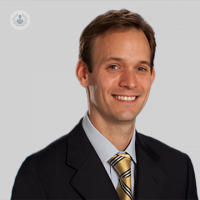ENT problems in children: a guide for parents
Written in association with:Ear problems commonly occur in children, and may be a cause of concern for parents. Leading consultant children's ENT specialist Mr Richard Hewitt answers questions parents may have about their child’s ear problems.

What are the common ear problems in children?
Children commonly experience ear infections, often due to a condition called glue ear. This occurs when the Eustachian tube, responsible for equalising pressure in the ear, fails to function properly during a phase of growth. This leads to negative pressure behind the eardrum and fluid buildup in the middle ear, which can cause hearing loss, especially when the fluid is thick. The limited blood supply in children's ears, combined with exposure to colds, can result in infections, causing pain and sometimes leading to burst eardrums and discharge. Glue ear is a frequent diagnosis in children as they grow.
How do I know if my child needs to see a paediatric ENT?
Over the past 10-15 years, the field of ENT, particularly in paediatric cases, has seen significant advancements. Previously, many ENT practitioners were primarily focused on adult cases and only dabbled in paediatric cases occasionally. However, with the formalisation of the speciality, paediatric ENT has emerged with unique techniques and approaches tailored specifically for children. These techniques, such as modified tonsil surgeries to reduce risks, are not typically offered by general adult practitioners due to their focus on adult conditions.
Seeking a paediatric ENT specialist offers several advantages. They specialise solely in paediatric cases, allowing them to be highly proficient in addressing the wide range of issues children face. Their focused practice also means they stay updated on the latest research and techniques in paediatric ENT care. However, there are instances, such as adolescent cases with adult conditions, where a general adult practitioner might be more suitable. Regardless of the practitioner, they must understand both adult and paediatric issues and know when to refer patients to specialists.
What are the treatments for nasal problems in children?
Nasal polyps are rarely found in children, while nasal obstruction is far more common. When nasal polyps do occur in children, they are usually associated with underlying conditions like cystic fibrosis. Diagnosing a child with nasal polyps involves a thorough investigation into the root cause, as it's uncommon in this age group. Medical and surgical treatments are available, but surgery is rarely needed, especially for young children without other medical issues. Treatment typically leans towards medical management, particularly in cases where nasal polyps are an isolated condition.
What are the common throat problems in children?
The most common throat issue in children tends to stem from tonsil infections, known as tonsillitis, which can be quite debilitating. In the past, particularly in the 60s, 70s, and 80s, tonsil removal was often overdone, with many unnecessary surgeries performed, driven partly by a medical trend and geographic factors. However, there has been a significant shift since the 1990s, with a reduction in unnecessary tonsillectomies due to concerns about their impact on the immune system.
The decrease in tonsil surgeries has helped identify who truly needs the procedure, distinguishing between those with genuine recurrent infections and those with naturally large tonsils that might be mistaken for infection-related inflammation. However, accessing tonsil removal on the NHS can be challenging due to capacity issues and a lack of clear guidelines on when surgery is appropriate for recurrent infections.
Education plays a crucial role in guiding medical practitioners in understanding the latest thoughts on tonsil infections. While other throat issues like post-nasal drip and chronic laryngitis exist, they are less common compared to tonsillitis.
What are the risks of surgery for ear, nose and throat problems in children?
Answering this question is complex due to the diverse range of operations available, each with its unique set of risks. Paediatric surgeries often require general anaesthesia because children are typically less tolerant of procedures under local anaesthesia or while awake, understandably finding them frightening. However, the risk of anaesthesia for otherwise healthy children over one-year-old is very low compared to adults.
The aim of using general anaesthesia in children is to ensure they are completely asleep, pain-free, and have no memory of the procedure, which helps in both performing the surgery effectively and reducing distress. Despite this, the process of going to sleep and waking up in a recovery room can be daunting.
The risks associated with paediatric surgeries vary depending on the procedure. Some, like inserting ear tubes (grommets), carry minimal risk of complications such as infection. However, more invasive procedures like tonsil removal can pose a higher risk of bleeding or infection, albeit still relatively low.
There's no one-size-fits-all answer regarding the risks of paediatric surgery; it heavily depends on the specific procedure and the underlying condition being treated.
If your child is suffering from ENT issues and you would like to book a consultation with Mr Hewitt, do not hesitate to do so by visiting his Top Doctors profile today.


